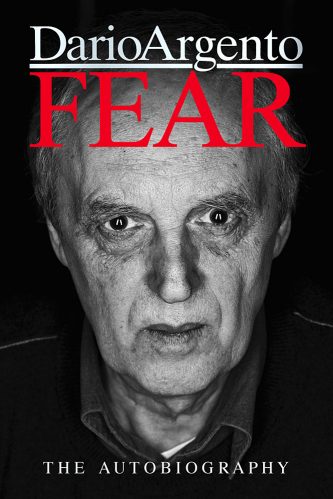 By DARIO ARGENTO (FAB Press; 2014/10)
By DARIO ARGENTO (FAB Press; 2014/10)
This is the long awaited autobiography by Dario Argento, and (for once) it doesn’t disappoint. Argento is of course the Italian film director whose films, as the title of this book indicates, lean toward the fearful, and include classics like DEEP RED, INFERNO, TENEBRAE and OPERA. All are covered in prose that proves Argento’s writing abilities nearly match his filmmaking prowess. Kudos are also due to Alan Jones, who translated the book from the Italian, and provides unobtrusive footnotes to help American and British readers comprehend Argento’s highly Italian-centric recountings.
It opens with a description of Argento, during the shooting of SUSPIRIA, awakening in a hotel room with disturbing suicidal proclivities. From there he flashes back over his life, beginning with his childhood in Rome; it was then, at age four, that Argento was taken to a performance of HAMLET, and indelibly marked by the appearance of the ghost of the title character’s father. Thus an affection for the horrific was birthed that lasted through his “stormy relationship with school,” his work as a film critic in the 1960s and his first important film work.
That job was provided by Sergio Leone, who hired Argento and Bernardo Bertolucci to write the treatment for ONCE UPON A TIME IN THE WEST (1968). This led to Argento’s 1970 directorial debut THE BIRD WITH THE CRYSTAL PLUMAGE, financed by his father Salvatore. The film, a horror-mystery, was a massive worldwide success that effectively set the course for Argento’s subsequent filmography.
Suspiria 1977
Despite frequent hassles with Italian censors Argento enjoyed great success during his heyday in the 1970s and 80s, and equally great failure in the ensuing decades, with a string of mediocre-to-awful films like TRAUMA, THE PHANTOM OF THE OPERA, GIALLO and DRACULA 3D. He brushes off the criticisms of those later films with the observation that “Tastes change, all one has to do is wait,” although he does (inadvertently) reveal the likely reason his post-1990 films are so much less interesting than those that came before: the fact that the demons that drove him in his earlier years, as elucidated in the opening anecdote about feeling dissociative during the making of SUSPIRIA, have been silenced. Despite later life problems that included a bankruptcy and a two year feud with his actress daughter Asia, Dario Argento in his old age appears to be fully content with the world, and signs off with the fitting proviso that “As long as there’s always someone out there to scare, I’ll be happy.”
